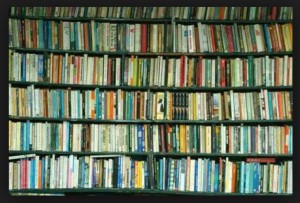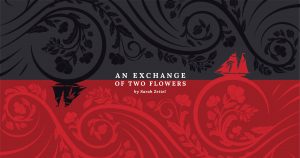If you’re interested in digging into the background of “An Exchange of Two Flowers,” there’s an excellent new book out. Stephen R. Platt’s “Imperial Twilight,” presents the facts and the harsh difficulties of the world in which Charles Elliott and High Commissioner Lin had to make their way. You can check out the New York Times review here.
Posts Tagged ‘Historical Fiction’
How Did it Start?
Nothing in this world happens in a vaccum. Everything is related, especially when it comes to the desire for resources, and the desire to explore. The events in “An Exchange of Two Flowers,” are actually tied up in the need, and the desire for three plant-based resources. In the novella, I’m focused on two men — Lin Zexu, and Charles Elliot and two plants – tea and opium. But there was a third plant tied into the story. Cotton.
The British had planned to be able to pay for the tea they wanted from China with a trade in cotton, which they’d get from what was becoming their colony of India. But the Americans, with clipper ships and, yes, slave labor, could get American grown cotton to the English mills cheaper, and faster than the British could get it home from India. So, there was not enough profit to buy the tea in the quantities that the English public demanded.
This left the English in a quandry. And they were determined to solve it.
Enter the opium poppy…and so our story begins…
MORE RESOURCES:
Here’s an excellent overview of the history of what the English called “the China Trade” from MIT.

Starting Over, Again
I’m starting over, again.
This is nothing new. The life of the writer is about starting over. Fiinsh one project, close it out, hopefully send it out, and start the next. If you are not living this cycle, as a writer, you are doing something wrong.
That doesn’t mean it gets easier.
This time I’m starting over on the last book of a series — Palace of Spies, Book 3. So far, I’ve got a lot of characters, a time line, a deradline and no plot. At all. None. Zip.
I’m not panicking, just a little frustrated. I know that whatever plot I may have thought I had, as I write, it will change, kind of a lot. Okay, you can take the kind of out of that sentence. It will change a lot. But I do need to have at least some kind of line of sight so I can start stringing words together.
But rest assured, Dear Reader, Peggy and Friends will be back. I’ve left the door open, and the coffee is waiting. I’m quite sure there is nothing to be alarmed about. After all, what could possibly have happened to them?
Oh, wait…this is Peggy we’re talking about, right?
Time to get started over…
Sarah Zettel and the Big Book — Part Two
TROPHIES
 I belong to the Subculture of the Book. In my culture, books are not just containers for words, they are prizes, trophies, and they come with bragging rights. I have had whole conversations with friends about how many books we own, how many new bookshelves we’ve had to buy; the problem of trying to squeeze one more bookshelf into a small house or apartment; how many individual volumes we own and whether they’re double stacked on those shelves. We bemoan the difficulties of book storage and management in that particular way that is really kind of closer to bragging than actual regret. And we always buy more books. The size of your To Be Read pile is a big part of the Subculture of the Book.
I belong to the Subculture of the Book. In my culture, books are not just containers for words, they are prizes, trophies, and they come with bragging rights. I have had whole conversations with friends about how many books we own, how many new bookshelves we’ve had to buy; the problem of trying to squeeze one more bookshelf into a small house or apartment; how many individual volumes we own and whether they’re double stacked on those shelves. We bemoan the difficulties of book storage and management in that particular way that is really kind of closer to bragging than actual regret. And we always buy more books. The size of your To Be Read pile is a big part of the Subculture of the Book.
Ebooks have not changed any of this. That may be because I hang out with fellow geezers, but there you have it.
The Big Book is emblamatic of my culture. I did buy it because I was curious about the contents. But I also bought it simply because it was big and beautiful and I wanted it. Some people do this with shoes or cars. I do it with books. And clothes. But mostly books.
Lately, though, I’ve begun to question the subculture of the Book, and I hate to say, it’s in part because of the Big Book. It’s turned out to be a good book. There are parts of it that are really brilliant. But like I said in my previous post, this Big Book sat on my shelf for years, and it had plenty of company. That shelf? Let me show it to you. It’s six feet tall, four broad and it’s stuffed with books I haven’t read. And I keep buying more and piling them in. I mean there’s a TBR pile and there’s hoarding. If books were cats, the neighbors would have called the humane society by now.
A few years ago, I tried be systematic about things. I was going to start at the top left of the shelf and read every book in order. I mean, I bought them, right? I bought them because I wanted to read them, not just own them right? What is the point of a book you don’t read?
That effort, I confess failed miserably. So, there it sat, big and beautiful and completely unread, with all those other beautiful, unread books.
Books are a good thing. You can never have too many, right? This is practically the motto of the subculture of the Book. And yet…and I ask this seriously…what is the point of having more than you can read?
Has counting coup and the luxury of ownership become more important to me than the stories?
Sarah Zettel and The Big Book — Part One
BRINGING HOME THE BIG BOOK
 I’m reading a Big Book. Seriously. This thing is big. Douglas-Adams-space-metaphor-level big. Over 1300 pages long.
I’m reading a Big Book. Seriously. This thing is big. Douglas-Adams-space-metaphor-level big. Over 1300 pages long.
It’s called Hunger’s Brides and it’s by a Canadian scholar/author named Paul Anderson. In part, it’s about a scholar nun in 17th century Mexico named Sor Juana Ines de la Cruz (http://www.poets.org/poet.php/prmPID/1032), who was a famous poet and thinker and who I’d never heard of. She also, incidently, fell afoul of the Inquisition. Wrapped around this is a modern story featuring a couple of literary tropes: the Middle Aged Man who is discovering he’s missed the point of his own life, and the tragic, sexually abused girl. More about them later.
The Big Book has actually been sitting on my shelf for a long time. I admit, it came home with me under somewhat shameful circumstances. I got it on a vulture run.
My town used to have a bookstore in my town called Shaman Drum. Shaman drum was kind of arty, and more than a bit highbrow. Great poetry section, lots of “literary” novels, and a lot of obscure and scholarly history books I’d never see anywhere else. This was mostly why I went there. I’d get a new project going and I’d always drop in at Shaman drum to see what they had on the relevant area of science, history or politics.
This was where I first saw The Big Book. It was hard to miss. It had a lovely cover, all black and terracotta, and took up as much shelf space as 3 regular books. Plus, it had a little staff recommendation card underneath it, attesting to the fact it was not just any old Big Book but a Good Big Book. I’m pretty sure I remember picking it up at the time, mostly to marvel that such things were still being published.
Then came the Millenium and all that followed, and like a lot of bookstores, Shaman Drum closed. With the closing came the sale, and I went, with mixed feelings as I do to such sales. I want the books, but hate the fact that I’m buying so many because they’re cheap because the store is closing. I hate the feeling of not just robbing a corpse, but a friend’s corpse.
Well, there I was, trying to sort out which books a) were the most interesting and b) I was least likely to stumble across elsewhere, and there it was — The Big Book. I could not resist. It was a lovely book, with a lovely cover, and, in case you haven’t guessed by now, it fed into my fascination with books as artifact. This one was dramatic. Big Book came home with the rest of the stack, and went onto the 6 ft. tall Ikea bookcase that is my personal TBR pile. There it sat, for…years.
Palace of Spies Scores Another Review
 It has been a terrific launch week for Palace of Spies. I cannot send out enough thanks to the folks who have taken the time to read the book and give it so many thoughtful, and enthusiastic review. Here’s just one of the latest up at I am Indeed.
It has been a terrific launch week for Palace of Spies. I cannot send out enough thanks to the folks who have taken the time to read the book and give it so many thoughtful, and enthusiastic review. Here’s just one of the latest up at I am Indeed.
News and Reviews for Palace of Spies
Palace of Spies has picked up some terrific new reviews for its Happy Book Day:
Dandelion Dreams says: “Sarah Zettel is an amazing storyteller. Her writing is so eloquent, the words flowing easily across the pages making for a quick yet intriguing read. I thoroughly enjoyed reading about Peggy and her adventures at court. Peggy’s voice is easy to love and every moment she was being her witty, clever self I found myself liking her more and more. She’s incredibly smart, and rarely ever misses a beat when talking among the royals. The mysteries surrounding Francesca kept me turning the pages and Peggy’s determination to discover just what happened to the girl who was clearly much more than the outward exterior she portrayed for those of her who new her best at court was fascinating.”
Eileen Dandashi says: “Sarah Zettel wrote a believable mystery and was highly entertaining. The ratcheting up of intrigue kept me on the edge of my chair! And there were several points it got a chuckle out of me, too. As a reader, I was swept up into the story on the first page.”
And then there’s a bit of an interview with Book Whales.
